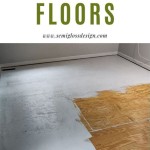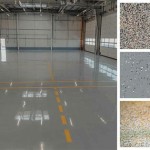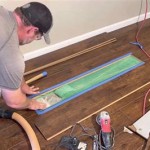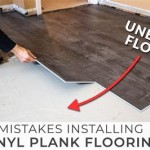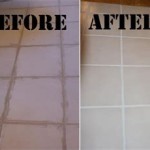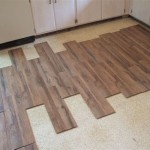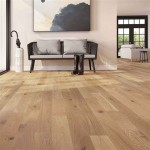Which Is Better for Basement Flooring?
Basements present unique challenges for flooring due to their susceptibility to moisture and potential for flooding. Choosing the right flooring requires careful consideration of various factors, including budget, aesthetics, and the basement's intended use. This article explores several popular basement flooring options, comparing their pros and cons to help inform the decision-making process.
Concrete Flooring
The existing concrete slab in a basement can serve as the finished floor. This is the most budget-friendly option, requiring minimal materials and labor. Concrete can be stained, painted, or sealed to enhance its appearance and protect it from moisture. Epoxy coatings provide a durable, waterproof layer, making them suitable for workshops or utility areas.
While cost-effective and durable, concrete can be cold and hard underfoot. It also transmits moisture readily, which can lead to condensation issues in humid climates. Proper sealing and insulation are crucial to mitigating these drawbacks.
Tile Flooring
Tile is a popular choice for basement flooring due to its water resistance and durability. Ceramic and porcelain tiles are particularly well-suited for basements as they are less porous than other tile types, reducing the risk of water damage. Tile comes in a wide range of styles, colors, and patterns, offering design flexibility.
Installation can be labor-intensive and requires a level subfloor. While tile itself is waterproof, the grout lines can be susceptible to moisture penetration if not properly sealed. Tile can also feel cold, although this can be mitigated with radiant underfloor heating.
Vinyl Flooring
Vinyl flooring offers a waterproof, affordable, and easy-to-install alternative to tile. Sheet vinyl, vinyl planks, and vinyl tiles provide various aesthetic options, mimicking the look of wood, stone, or ceramic. Vinyl is comfortable underfoot and relatively warm compared to concrete or tile.
While generally durable, vinyl can be susceptible to scratches and gouges. The quality of vinyl flooring varies significantly, with lower-end options potentially containing volatile organic compounds (VOCs). Choosing low-VOC or VOC-free vinyl is recommended for indoor air quality.
Engineered Wood Flooring
Engineered wood flooring offers the aesthetic appeal of hardwood with enhanced stability in moisture-prone environments. Constructed with layers of plywood topped with a hardwood veneer, engineered wood is less susceptible to warping and buckling than solid hardwood. It also offers easier installation and can be installed as a floating floor.
While more resistant to moisture than solid hardwood, engineered wood is not waterproof. Standing water can cause damage, making it less suitable for basements prone to flooding. Proper moisture barriers and subfloor preparation are essential for successful installation.
Laminate Flooring
Laminate flooring is a cost-effective option that simulates the look of hardwood or tile. It is composed of a fiberboard core topped with a decorative layer and a wear-resistant coating. Laminate is relatively easy to install and maintain.
Laminate is more moisture-resistant than solid hardwood but is not waterproof. Exposure to standing water can cause irreversible damage. Moisture can also seep into the seams between planks, leading to swelling and warping. Careful consideration should be given to the basement's moisture levels before choosing laminate flooring.
Carpet
Carpet offers warmth and comfort underfoot, making it a desirable option for basement living spaces. However, carpet is generally not recommended for basements prone to moisture or flooding. Carpet can absorb moisture, leading to mold growth and unpleasant odors. If carpet is desired, it is crucial to choose waterproof carpet tiles or install a waterproof subfloor.
Regular cleaning and maintenance are essential to prevent dust mites and allergens from accumulating in carpet fibers. Adequate ventilation is also necessary to control moisture levels and prevent mold growth.
Rubber Flooring
Rubber flooring is a durable and water-resistant option suitable for basement gyms, playrooms, or workshops. It provides excellent cushioning and sound absorption, making it comfortable underfoot and reducing noise levels. Rubber flooring comes in various colors and textures, including interlocking tiles and rolls.
Rubber flooring can be more expensive than other options like vinyl or laminate. It can also emit a distinct odor, particularly when new. Choosing low-odor rubber flooring and ensuring adequate ventilation can minimize this issue.
Cork Flooring
Cork flooring is a sustainable and comfortable option made from natural cork bark. It provides excellent insulation, both thermally and acoustically, making it warm and quiet underfoot. Cork is naturally resistant to mold and mildew, making it a suitable choice for basements with moderate moisture levels.
Cork flooring is relatively soft and can be susceptible to dents and scratches. It requires sealing to protect it from moisture and staining. While more moisture-resistant than some options, cork is not waterproof and can be damaged by standing water.

5 Best Flooring Options For Basements Floors2day

What Is The Best Flooring For Basements Get Pros And Cons

What Are The Best Flooring For Basement In Homes

Selecting The Best Basement Flooring Next Day Floors

The Best Flooring Options For Your Basement America

Best Basement Flooring Options Forbes Home

The Best Flooring Options For Your Basement From Forest Llc

Basement Flooring Guide

The Best Basement Flooring Options For Your Home

White Bamboo 1 2 Inch 12mm Cork Floating Flooring
See Also
